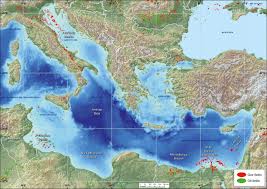Time for a Course Correction
By David Gordon and Thomas Wright, Foreign Affairs
The Coalition of Radical Left, a Greek political party known by the acronym Syriza, took power in January 2015 with a simple, if ambitious idea: it would put an end to austerity in Greece. For years, Greece had cut back its spending in exchange for tens of billions of dollars in bailout loans from the so-called troika—the European Central Bank, the European Commission, and the International Monetary Fund. Now it would play a high-stakes game of chicken by launching new negotiations, betting that its largest creditor, Germany, would grant generous concessions to avoid the risk of a Greek default and exit from the eurozone.
The negotiations turned out rather differently than Syriza expected: Germany refused to budge. And when Athens doubled down, Berlin clung to its position even more tightly. In February, Greece backed down on most of its demands and accepted a four-month extension of the bailout, something Syriza had said it would never do, in exchange for some more discretion in deciding which austerity reforms to implement. Meanwhile, Greece is set to face a new crisis this summer, when it is scheduled to repay its creditors some $7 billion—and it may run out of money well before then. Next week, the country plans to present its eurozone lenders with a list of proposed reforms, with the hope of unlocking more bailout funds.
How did Syriza end up here? By focusing narrowly on Germany, Greece forgot about the interests of the other players involved. Simply put, Athens behaved in ways those actors found deeply threatening, which effectively united Europe against it. To repair the damage, Syriza has little choice but to change course, altering its message and adjusting its demands.
POKER FACES
The negotiations involved five actors: Germany, Greece, the countries of northern Europe, the governments on the EU’s so-called periphery, and the European Central Bank (ECB). Understanding why Syriza failed to achieve its objectives requires an understanding of the motivations of each.
For Germany, a conciliatory deal with Greece is fraught with danger. Granting Greek demands could encourage other countries to elect governments just as unreasonable as Greece’s. German Chancellor Angela Merkel also faces domestic pressures at home, where elements within her own party oppose concessions to Greece. This past February, the euroskeptic Alternative für Deutschland, a party that opposes the Greek bailout, won its first seats in a west German regional assembly.
A hard-line approach, on the other hand, carries its own risks. Although media reports suggest that Germany believes it could contain the damage of a disorderly Greek exit from the EU, there is no way of anticipating the full repercussions of one. (After all, the ramifications of the collapse of Lehman Brothers in 2008 were far greater than many observers and officials anticipated, and German optimism could be just as misplaced.) Then there is the political defeat that a Greek exit would represent for Merkel; after her years of doing whatever it took to keep the eurozone intact, failure would arrive anyway. A Greek exit could also pave the way for other countries to do the same.
The northern European states—Estonia, Finland, Latvia, Lithuania, and Sweden—all support Germany’s reluctance to offer the Greek government substantial concessions. Greece still owes Finland a substantial sum, for example; a debt haircut would play to populist parties seeking an upper hand in Finland’s upcoming elections. These states, feeling under threat from Russia, harbor an additional grievance: they believe that Ukraine, rather than Greece, deserves special support from Europe. And they are unhappy with reports of Greece’s warming relations with Russia.
The peripheral states, which include Ireland, Italy, Portugal, and Spain, have another set of concerns. On the one hand, they are attracted to the idea of following Greece’s lead and renegotiating the terms of their own debts. On the other hand, they have spent the past five years telling their citizens that they got the best deal they could—and that austerity was a necessary evil. The far left in each of these countries (and, to a lesser extent, the far right) has claimed that the governments could have gotten better deals by threatening to burn their bondholders.
These governments view Syriza especially warily. If Greece gets a special deal, it will destroy the case they have been making to their citizens throughout the crisis. It will also empower populist parties, such as Podemos in Spain and Sinn Fein in Ireland, in forthcoming elections this year and next. At the same time, however, they do not want Greece to default because its disorderly exit from the eurozone would renew doubts about their own membership in the monetary union. For these governments, the best option would be to provide proof that their approach is delivering results, in the form of economic growth and increased flexibility from Germany and the ECB—while the more hard-line Syriza struggles to stay afloat.
In many respects, the ECB’s position is similar to Germany’s. It wants Greece to adhere to its previous commitments and opposes a debt write-off. And it can apply significant pressure to Greece’s economy. The bank could refuse to accept Greek sovereign bonds as collateral in exchange for continued funding and stop providing Greek banks with much-needed liquidity, which would create a run on the country’s banks and lead to economic collapse. Yet the ECB is not confident that it could contain a Greek economic crisis, which could quickly spiral out of control and force Greece from the eurozone—an outcome the bank would be widely blamed for.
PERCEPTION PROBLEM
By failing to take into account the interests of these players, Syriza made a number of missteps. The first concerned the governments on Europe’s periphery. To secure their support, Syriza needed to find a way of assuring these countries that they would not suffer if Greece succeeded. But Syriza made no such effort. Instead, Greek officials alienated them.
Yanis Varoufakis, the Greek Finance Minister, for one, singled out Italy for having debt that was “unsustainable,” which served only to infuriate Italian Finance Minister Pier Carlo Padoan, who responded that Italy’s debt was “solid and sustainable.” Padoan later admonished Varoufakis at a meeting of European finance ministers, saying, “This is not some prisoner’s dilemma exercise.”
Other governments added their own fuel to the fire. Irish Prime Minister Enda Kenny called on Greece to fulfill its existing commitments. Portuguese Prime Minister Pedro Passos Coelho termed Syriza’s plan to restructure its debt a “fairytale.” And Spanish leaders, fearful of a possible defeat at the hands of the anti-austerity party Podemos, took the toughest line, demanding that Greece back down. “It cannot be that we change the rules just because there is a political change in a country,” the country’s budget minister said. “It would mean the collapse of Europe.”
The opposition from southern Europe was a bitter awakening. In a speech on February 28, Greek Prime Minister Alexis Tsipras accused Spanish and Portuguese leaders of leading an “anti-Greek axis.” Their plan, he said, “was and is to wear down, topple, or bring our government to unconditional surrender before our work begins to bear fruit and before the Greek example affects other countries. And mainly before the elections in Spain.”
Tsipras alienated Germany’s allies in northern Europe as well. Within a day of winning the Greek election, he called the Russian ambassador and protested the EU’s statement condemning Russian-backed Ukrainian separatists for an attack on civilians in a Mariupol market—moves that irked the Baltic states in particular.
A second mistake had to do with messaging. Tsipras, empowered by his recent election, argued that the rest of Europe had to recognize the sovereign right of the Greek people to reject austerity. But this argument made Greece vulnerable to an obvious counterattack. Greece owes much of its debt to other European governments and, by extension, to other European taxpayers. “Yes, we must respect Greek voters,” German Finance Minister Wolfgang Schaueble said at a press conference in February. “But we must also respect the voters of other European countries.” Framing the issue this way essentially allied Germany with the peripheral countries, turning the debate over Greek adherence to its original deal into a litmus test for democracy throughout the eurozone.
A third error was Syriza’s bet that Germany cared much more about the avoiding a Greek exit than about moral hazard or domestic politics. That was a fundamental miscalculation, for Berlin has so far ceded little ground. But even then, Greece could have survived its mistakes were it not for one other fatal decision: to move forward with its electoral platform before renegotiating its debt, increasing government spending without the requisite funds and reversing or stalling key reforms, such as the privatization of the state electricity company, without considering the corrosive effect on market confidence. All these factors positioned Greece to buckle in its negotiations. It was simply hemorrhaging far too much money far too fast to hold its position.
TALKING IT OUT
The Syriza government may have failed in its negotiating strategy thus far, but the game is far from over. For now, Greece faces a period of fundamental uncertainty; moving forward, it can either negotiate for more time to pay off its debt or reject its commitments outright. Negotiating a new deal won’t be easy, of course. And it will be even harder to convince other EU members, all of which would need to ratify a new deal, to go along. Opposition is running particularly high in Merkel’s own political party, the Christian Democratic Union. Many European officials expect, and would welcome, the collapse of the current Greek government were it unable to meet its debt obligations.
To have any chance of getting a new deal, Syriza must overhaul its strategy in several ways. First, the party must change the narrative. It must stop talking about how the rest of Europe must respect its sovereign right to reject austerity and start talking about Europe’s interest in a successful Greece. No one wants to see prolonged uncertainty about the euro’s future, greater political instability, or a Greek drift toward Russia. Speaking after her meeting with Tsipras, Merkel said, “We want Greece to be strong economically, we want Greece to grow, and above all we want Greece to overcome its high unemployment.” This is the kind of win-win narrative that could propel the negotiations forward.
Moreover, Tsipras’s strongest argument has little to do with democracy: it is simply that austerity has not worked. In this respect, the facts are in his favor. The Greek economy contracted by 25 percent during the crisis and the country’s downturn has continued into 2015. The country’s debt burden is unsustainable over the long run, and its banking system is on life support.
The Greek government also needs a strategy that advances the interests of the EU’s peripheral states—something best achieved through a multilateral process that allows all members of the eurozone to strike a new bargain. This process would focus on the mainstream governments in Ireland, Portugal, Spain, and Italy and would also include the Syriza government, although not as the leading player. In countries such as Spain and Portugal, it would have the advantage of addressing populist concerns about austerity head on. And in Germany, it would raise the costs of a maintaining a hard-line position.
Talks could consider ways of promoting growth in the eurozone, whether by encouraging greater spending on infrastructure in Germany, relaxing the requirements for governments to run surpluses even while they remain in debt, or laying out a framework for reducing debt burdens over time as certain conditions are met. Although Germany is unlikely to agree to such measures, the diplomatic act of proposing a multilateral process to consider them would help Athens improve its relations with other peripheral states and strengthen its negotiating position over the long term.
Making that transition will be painful. Tsipras has already come under fire from some members of his coalition for moderating his demands in February. He will need to liberate himself from the radical wing of his own government known as “the left platform”—approximately 30 members of parliament led by Energy Minister Panagiotis Lafazanis. This group opposed the extension of Greece’s latest agreement and will oppose any softening of Syriza’s negotiating position. If he remains beholden to Lafazanis for support after the current extension expires, Tsipras will have little room to maneuver. But there is another option: bringing To Potami, a small pro-European party with 17 seats, into his government. This move would also put an end to the perception that the Greek government is run by a narrow coalition of the anti-European left and right while keeping Syriza independent from the country’s traditionally dominant parties. And it would avoid the uncertainty of holding new elections.
There would be difficulties, to be sure—Tsipras would still need the support of the Independent Greeks, a nationalist party—but the approach would create the political space for compromise. As To Potami’s leader, Stavros Theodorakis, told The Financial Times earlier this month, “The Germans today are friends of Greece and we shouldn’t have government ministers pursuing a hostile relationship with them.” To Potami would support Syriza, he said, “provided it wants to keep Greece in the euro and make the structural reforms it promised.”
There is reason for hope, then. After a very rough start, Tsipras did finish off the extension negotiations well. He wriggled off the hook he put himself on in the first few weeks. He began to moderate his rhetoric. And he sold difficult compromises to his party. But the coming months will prove even more challenging. Only by taking a broader view—considering all the players involved—can Tsipras save Greece from ruin.



















